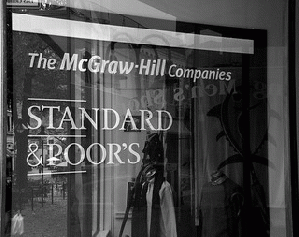(Article changed on April 15, 2013 at 14:14)
In seeking to prevent the South Carolina Attorney General from filing a lawsuit, Standard & Poor's attorneys, Cahill Gordon & Reindel, asserted one of the most fatuous legal arguments of the 21st century. "Credit ratings are fully protected by the First Amendment," they claimed.
Here's how Cahill Gordon partner Floyd Abrams put it to The New York Times:
It shouldn't change the legal dynamics that rating agencies are more important, or play a greater role, or are looked to by this or that element of the marketplace...The major similarity here is that both the newspaper and S.& P. are offering opinions on matters that people can and do disagree about.Really? A credit rating is just like an opinion published in a newspaper? Mr. Abrams should Google the words "Henry Blodget."
by Funky Tee
Journalistic Opinions Versus Professional Opinions
Blodget wrote lots and lots of opinions about different companies. Most of those opinions were published by media outlets, and some of them were published by Merrill Lynch, where he worked as a securities analyst during the dot.com bubble.
The SEC went after Blodget for committing securities fraud because he assigned inflated ratings, i.e. "buy" ratings, to companies like InfoSpace, Inc., 24/7 Media, Inc., and Homestore.com, Inc. when he was an analyst at Merrill.
Blodget never had the audacity to claim that his ratings and opinions for Merrill were merely a "journalistic" effort, for obvious reasons. Every lawyer who ever bought malpractice insurance understands the difference between a journalistic opinion and a professional opinion. Merrill's and Blodget's work product were regulated by the SEC, the NASD and the NYSE. When he was a securities analyst Blodget wrote professional opinions, which are governed by certain minimal standards of care.
Of course professionals can have different opinions, which is why a patient may seek out a different physician for a second opinion on his diagnosis. But a doctor can still lose his license if he expresses his "opinion" that Oxycontin is appropriate for mild headaches because it is not addictive.
Blodget settled with the SEC, by giving up $4 million and agreeing to a permanent ban from the securities industry.
Guess who else is licensed and regulated by the SEC? S&P and the other rating agencies. The triple-A ratings assigned by S&P and Moody's to various CDO investments were probably more disreputable that Blodget's "buy" ratings for certain dot.com startups.
Yes, the First Amendment does protect the free expression of opinion, which is why newspapers are not regulated and journalists are not licensed. And this is why the Federal Drug Administration never went after John Tierney for touting the unfettered use of Oxycontin.
Journalistic Opinions Versus Legally Sanctioned Opinions
The rating agencies do not publish individual opinions, like those of a security analyst at Merrill. They publish opinions set by ratings committees; a rating is the work product of an institutionalized vetting process, just like the FDA process for approving over-the-counter sale of a new drug, or the process for licensing a new attorney.
These vetting processes never guarantee an outcome--a drug may have harmful side effects for some people, and a licensed physician may demonstrate gross incompetence--but people can be held liable for compromising the integrity of that vetting process.
(Note: You can view every article as one long page if you sign up as an Advocate Member, or higher).





